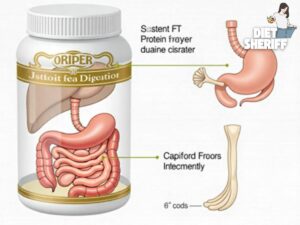Protein drinks have become a go-to for athletes hoping to gain muscle and enhance their general well-being. But how long does it take for a protein shake to kick in?
Dietary protein digests at varying speeds depending on its kind. Protein is made up of amino acids, which are absorbed at a rate of 1.3 to 10 grams per hour.
Although 20 grams of slow-digesting protein can take more than 15 hours to digest, 20 grams of fast-digesting protein may require 30 minutes to 2 hours only.

How Does Your Body Handle the Protein Shake?
The three main forms of protein found in protein shakes are soy, casein, and whey. The protein shake undergoes several digestive processes after it is swallowed.
Salivary enzymes break down the protein into tiny bits in the mouth, which is the initial step. The protein then travels to the stomach, where digestive enzymes and stomach acid continue to break it down. This is only the beginning of the process, therefore there is not much protein degradation.
The pancreas releases enzymes in the subsequent stage that break down protein and other essential nutrients into tiny pieces.
Once in the bloodstream, these nutrients are used by the body to repair and grow muscular tissue in the muscles and other parts of the body. But how long does it take for a protein shake to kick in?
It is crucial to remember that a person’s total diet and exercise regimen, as well as the kind and grade of protein consumed, all affect how beneficial protein shakes are in helping people gain muscle growth.
Even while they might be a practical and efficient approach to increasing protein consumption, protein shakes shouldn’t be the only source of protein in a person’s diet.
Related Articles: What Does Protein Powder Taste Like?
How Long Does It Take for a Protein Shake to Kick in?
Your body’s rate of protein breakdown and usage for muscle growth and repair is influenced by a variety of factors.
The kind of protein you eat comes first. The rates at which various proteins digest vary. There are two main categories of proteins.
- Fast Digestion Protein
The body needs between thirty minutes and two hours to completely absorb proteins that break down quickly. When the body has to swiftly restore muscle protein stores after a workout, these proteins are perfect.
However, because the body absorbs them fast, they are not appropriate for extended durations of satiety.
Related Articles: Can You Put Protein Powder in Water?
- Slow Digestion Protein
Conversely, the body takes longer to absorb proteins with a slow rate of digestion, like those found in plants. For the body to properly absorb them, it takes about three to four hours.
These proteins are great for people who want to avoid muscle breakdown as they sleep and feel fuller for longer.
The makeup of your meal is another element that influences the digestion of proteins. Your body may digest food much more slowly if you combine protein with carbohydrates and lipids.
However, eating protein on its own on an empty stomach can hasten the process of digestion and absorption.
The Value of Understanding Protein Shake Digestion Time
If you are thinking how long does it take for a protein shake to kick in? understanding how long protein shakes take to digest will also help you get the most out of your exercise and meet your fitness objectives more quickly.
This is because how long it takes your body to break down the shake might affect how quickly your muscles absorb nutrients.
Learning when the protein shake will start kicking in can also help you prevent uncomfortable circumstances. It will also ensure that the body can adequately absorb the nutrients if you feel bloating or other digestive problems.
It is significant to remember that the length of time it takes for protein shakes to digest varies based on the kind of protein included. For instance, the body is known to absorb and digest whey protein more quickly than casein protein, which is absorbed more slowly.
This implies that whey protein might be a better choice for you if you’re searching for a rapid dose of protein following your workout. But casein protein might be a better option if you’re searching for a protein source that can give you energy steadily for a longer amount of time.
Related Articles: Does Protein Powder Have Lactose?
The Function of Enzymes in the Breakdown of Protein Shakes
Enzymes are essential for the digestion of protein shakes. Specialized proteins called enzymes disassemble bigger compounds into tiny pieces the body can consume diet sheriff.
One class of enzymes made especially for breaking down proteins is protease. Proteases found in the stomach, such as chymotrypsin, trypsin, and pepsin, aid in the breakdown of protein in meals and protein shakes.
The small intestine’s diverse digestive enzymes break down protein even further into smaller amino acids, which are then absorbed into the circulation.
Related Articles: Is Protein Powder Good for Teens? What Does Experts Say?
Factors Affecting Protein Shake Digestion Time
Protein shake digestion times vary based on several factors, including:
- Protein type: The rates at which different forms of protein are broken down vary.
- Quantity of protein: It takes longer to digest large amounts of protein.
- The existence of fat: A protein shake’s fat content slows down the digestive process.
- Additional foods eaten: The rate at which food is absorbed can vary when a protein shake is consumed with other meals.
- Rate of metabolism: The pace at which protein shakes are absorbed can also be influenced by an individual’s metabolic rate.
The Effect of Exercise on the Digestion of Protein Shakes
The body’s reaction to exercise can influence protein shake digesting time. Exercise improves the digestive system’s blood flow and oxygenation, which can enhance the effectiveness of nutrient absorption.
Exercise also promotes the synthesis of several digestive enzymes, such as amylase, which breaks down Starch, and lipase, which breaks down fats. For this reason, having a protein shake after working out could facilitate quicker absorption and digestion.
How to Consume Protein Shakes to Their Fullest Potential?
You must maximize the benefits of your protein shake by consuming it as recommended. Here are some pointers to get you started:
- Select the appropriate kind of protein based on your needs.
- Keep an eye on how much protein you’re consuming to ensure that it’s adequate but not excessive.
- Refrain from over-fattening your protein shake.
- You will receive the greatest advantages from your protein shake if you consume it shortly before bed or right after your workout.
Explore Also:
Creativehouseblog
Gigasecurehome
Mycleanseplan
How Long Does It Take for a Protein Shake to Kick In: FAQs?
What is the shelf life of a chilled protein shake?
You can safely store a homemade smoothie in the refrigerator for up to 72 hours.
Should you drink or chug a protein shake?
No. As with any other drink, you take your time and sip your shake.
Is it possible to consume protein shakes without food?
Having protein for breakfast on an empty stomach helps you meet your daily intake of macronutrients and sets your tone for the rest of the day.
Do protein shakes make me gain weight?
When excess consumption is combined with an unbalanced diet, weight gain may result.
References
https://enu-nutrition.com/blog/how-long-take-digest-protein-shake
https://www.m2proteins.com/time-duration-for-whey-protein-to-show-results
https://www.quora.com/How-long-does-it-take-to-see-results-from-drinking-whey-protein-shakes
How Long Does It Take For Protein To Digest? (torokhtiy.com)
How Long Does It Take To Digest A Protein Shake? (drinkwholesome.com)






